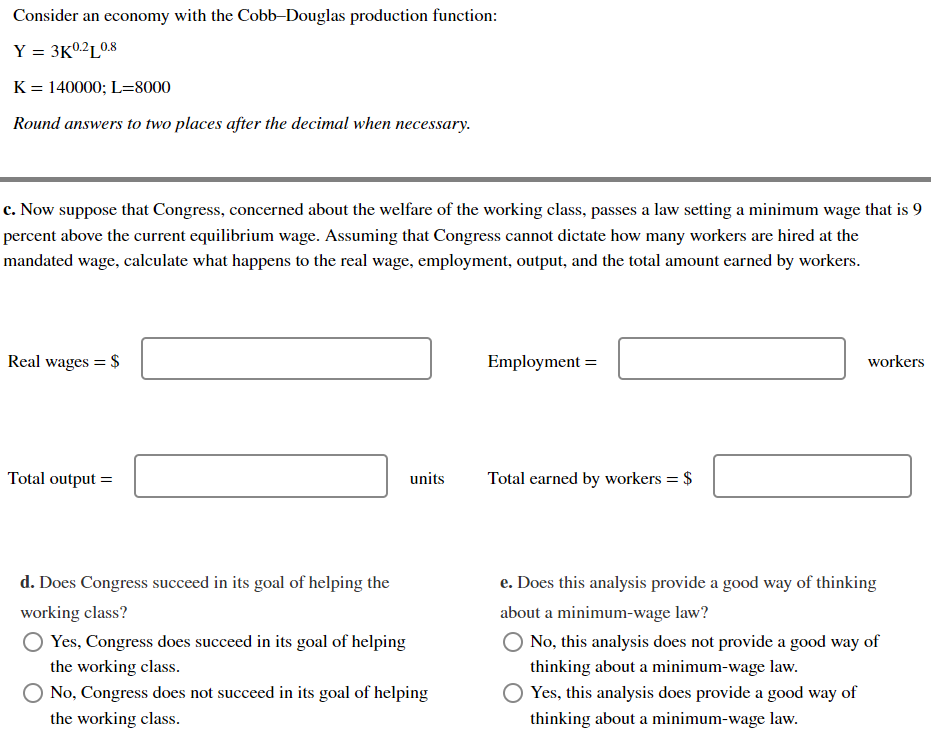Consider an economy with the Cobb-Douglas production function: Y = 3K0.2L0.8 K = 140000; L=8000 Round answers to two places after the decimal when necessary. . Now suppose that Congress, concerned about the welfare of the working class, passes a law setting a minimum wage that is 9 percent above the current equilibrium wage. Assuming that Congress cannot dictate how many workers are hired at the nandated wage, calculate what happens to the real wage, employment, output, and the total amount earned by workers. Real wages = $ Total output = d. Does Congress succeed in its goal of helping the working class? O Yes, Congress does succeed in its goal of helping the working class. units No, Congress does not succeed in its goal of helping the working class. Employment = Total earned by workers = $ workers e. Does this analysis provide a good way of thinking about a minimum-wage law? O No, this analysis does not provide a good way of thinking about a minimum-wage law. Yes, this analysis does provide a good way of thinking about a minimum-wage law.
Consider an economy with the Cobb-Douglas production function: Y = 3K0.2L0.8 K = 140000; L=8000 Round answers to two places after the decimal when necessary. . Now suppose that Congress, concerned about the welfare of the working class, passes a law setting a minimum wage that is 9 percent above the current equilibrium wage. Assuming that Congress cannot dictate how many workers are hired at the nandated wage, calculate what happens to the real wage, employment, output, and the total amount earned by workers. Real wages = $ Total output = d. Does Congress succeed in its goal of helping the working class? O Yes, Congress does succeed in its goal of helping the working class. units No, Congress does not succeed in its goal of helping the working class. Employment = Total earned by workers = $ workers e. Does this analysis provide a good way of thinking about a minimum-wage law? O No, this analysis does not provide a good way of thinking about a minimum-wage law. Yes, this analysis does provide a good way of thinking about a minimum-wage law.
Chapter14: Medical Care Systems Worldwide
Section: Chapter Questions
Problem 4QAP
Related questions
Question

Transcribed Image Text:Consider an economy with the Cobb-Douglas production function:
Y = 3K0.2L0.8
K = 140000; L=8000
Round answers to two places after the decimal when necessary.
c. Now suppose that Congress, concerned about the welfare of the working class, passes a law setting a minimum wage that is 9
percent above the current equilibrium wage. Assuming that Congress cannot dictate how many workers are hired at the
mandated wage, calculate what happens to the real wage, employment, output, and the total amount earned by workers.
Real wages = $
Total output =
d. Does Congress succeed in its goal of helping the
working class?
O Yes, Congress does succeed in its goal of helping
the working class.
units
No, Congress does not succeed in its goal of helping
the working class.
Employment =
Total earned by workers = $
workers
e. Does this analysis provide a good way of thinking
about a minimum-wage law?
O No, this analysis does not provide a good way of
thinking about a minimum-wage law.
Yes, this analysis does provide a good way of
thinking about a minimum-wage law.
Expert Solution
This question has been solved!
Explore an expertly crafted, step-by-step solution for a thorough understanding of key concepts.
Step by step
Solved in 3 steps

Knowledge Booster
Learn more about
Need a deep-dive on the concept behind this application? Look no further. Learn more about this topic, economics and related others by exploring similar questions and additional content below.Recommended textbooks for you


Survey of Economics (MindTap Course List)
Economics
ISBN:
9781305260948
Author:
Irvin B. Tucker
Publisher:
Cengage Learning


Survey of Economics (MindTap Course List)
Economics
ISBN:
9781305260948
Author:
Irvin B. Tucker
Publisher:
Cengage Learning